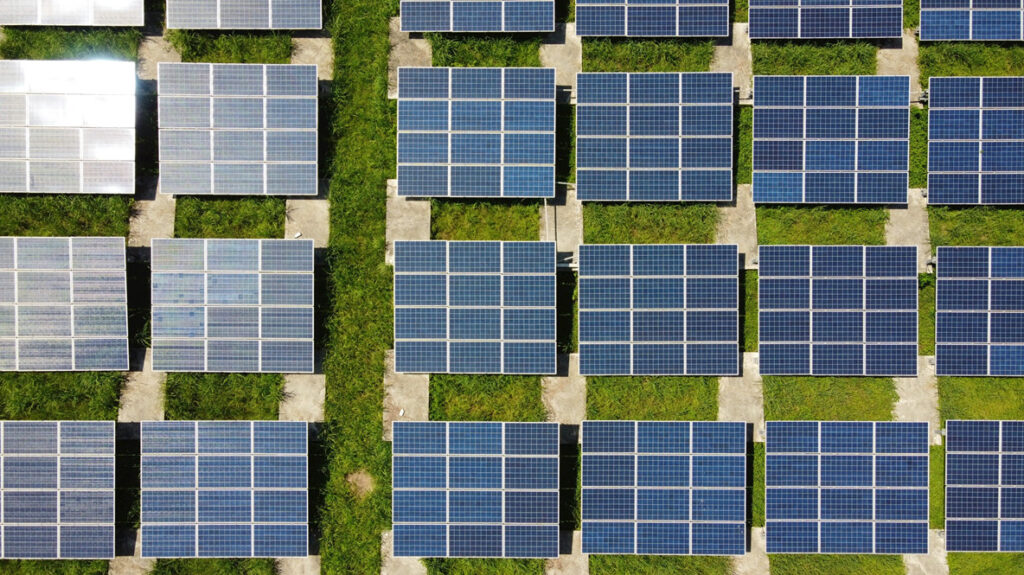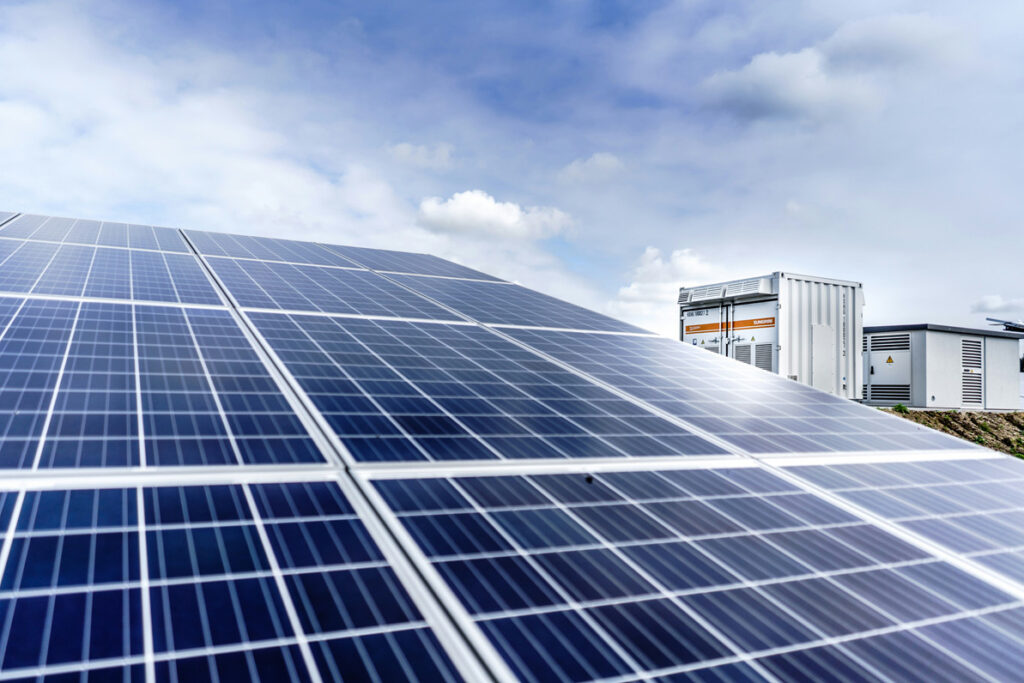Today, businesses of all sizes install solar energy systems. Going solar offers many potential benefits to your business. As a business owner, going solar could be one of the best ways to help you save money and support the development of renewable energy. It can also help a business build a sustainable brand image, earn a good financial return, or improve employee retention. Many Pennsylvania businesses use solar energy to reduce operating costs, lower their carbon footprint and promote resiliency and sustainability.
Commercial Installations
Most commercial and industrial solar installations are substantially larger than a typical residential solar power system. For comparison, the average size of a residential solar panel system is around 10 kilowatts (kW), while a commercial solar energy system can be up to several megawatts (MW), depending on the electricity needs of your business.
Unlike utility-scale solar, commercial solar power is “distributed generation,” which means the energy the system produces is used at or near the point of generation. Distributed generation projects like rooftop or ground-mounted residential solar are usually connected to the local electric grid. This allows your business to take advantage of net metering, a policy that enables you to send unused electricity back to the grid in exchange for electricity bill credits.

Affordability & Incentives
The upfront cost of a commercial solar panel system may seem substantial, but many incentives can lower the price tag. The cost of your system will come down to its size (measured in kW or MW), its system design (rooftop, carport canopy, or ground-mounted), and your eligibility for incentives and rebates. The best solar incentives available for businesses can reduce your system costs by approximately 70%. They include:
- Federal Investment Tax Credit (ITC): Whether you’re a business owner or homeowner, the federal tax credit is the most significant financial incentive for all solar shoppers. At least until 2025, the ITC provides a tax credit equal to 30% of the upfront cost of solar for businesses.
- Production Tax Credit (PTC): Instead of receiving the ITC, you can choose to get tax credits based on the amount of electricity your system produces (on a dollar per kilowatt-hour, $/kWh basis). If your project produces a lot of electricity and is relatively inexpensive to build, you may save more with the PTC than the ITC.
- Modified Accelerated Cost Recovery System (MACRS): MACRS is a depreciation benefit that allows you to lower your taxable earnings and recover the depreciated value of your solar installation over five years. When you combine MACRS with the solar tax credit, you can earn tax incentives worth about 70% of your system’s cost. Check with your accountant about how this may work for your specific situation.
- Bonus depreciation: Bonus depreciation is similar to MACRS, but you take the full depreciation benefit in the first year of your investment instead of over five years. You have to choose between MACRS and bonus depreciation, but again, your accountant will help you make the best choice for your business.
- Net metering: Some states and utility companies offer an incentive called net metering that can significantly increase your solar savings over time. Under net metering, your utility company provides you with credits for the excess electricity your system generates and sends to the grid. Net metering [https://programs.dsireusa.org/system/program/detail/65/net-metering] is strong in Pennsylvania, allowing you to receive credits on the energy generated by your solar panels.
For more details on financial incentives, see our previous blog post “What Are The Financial Options and Incentives for Installing Solar Systems”

Cost Savings
Commercial solar provides a great return on investment. According to the U.S. Energy Information Administration (EIA), in 2021, the average commercial building spent $650.04 on electricity (likely on par with most small-to-mid-sized-businesses). Over a year, this equates to $7,800 in operating expenses. Over 20 years, your business will spend about $156,010 on energy costs.
Making some basic assumptions on installing a system that offsets 90% of this electricity consumption and assuming the system’s average production ratio of 1.4, a system size calculation determines about a 45kW system. According to the table, the system costs of this size are about $39,150, including the ITC and five-year depreciation with MACRS. Calculating the savings over 20 years {(20-year electricity costs ($156,010) * system offset (0.9) – upfront solar energy system cost including incentives ($39,150)} means that your business saves about $101,259 in electricity costs with solar.
Independence & Stability
By generating their electricity, businesses can achieve a degree of energy independence, reducing their reliance on the grid and mitigating the impact of energy price fluctuations and shortages. This self-sufficiency in energy production can serve as a safeguard against power outages and ensures a continuous power supply for critical business operations.
Solar energy systems can help stabilize energy costs over time. Given the variability and tendency for traditional energy costs to increase, solar offers businesses the advantage of predictable and stable energy expenses, helping with more accurate planning and forecasting.
Additionally, once solar panels are installed, they require only minimal maintenance, which can lead to long-term savings on operational costs. The maintenance required over time helps to ensure they continue to perform optimally. This can include cleaning the panels regularly, checking wiring and connections, and replacing any damaged or worn-out parts.

Storage & Reliability
The best way to ensure the reliability of solar energy systems is through the use of energy storage systems. These systems store electricity for use at a later point in time. When paired with a solar panel system, an energy storage system will store any excess electricity produced by your solar panels for use after the sun goes down or when it’s cloudy. Energy storage systems seamlessly integrate into your business’s electrical system, automatically kicking in when the grid goes down to ensure your business operations don’t stop.
Energy storage provides two key benefits. First is backup power in the event of a grid outage. Secondly, for many commercial applications, energy storage can provide much greater financial benefits than it can to homeowners, especially if your business is on a complex utility rate with either demand charges or a time-varying price for electricity.
Part of the reliability of electricity has to do with ‘resiliency’, which really means emergency power in the event of a grid outage. Energy storage allows part or all of your business to run even when the grid is down. It’s not quite “off-grid,” but it does mean you can operate without the grid when you have to. If your business operates in an area that experiences frequent outages, then energy storage can help mitigate the impact of those events.
The biggest financial benefits from storage come if you have demand charges on your utility rate. Because it is set based on your maximum hourly power requirement, there is less incentive to reduce your overall usage throughout the month but rather to adjust how much electricity you require at once. This is where storage helps – since solar can reduce the amount of electricity you use in a given month, batteries can help reduce your peak demand in a month.
Similar to how some utilities have transitioned to demand charges, others have transitioned to time-varying rates. With energy storage, you can store electricity produced during the day when electricity rates are low to use later in the evening when rates increase. This allows businesses to ‘arbitrage’ the rate they pay for electricity throughout the day.

Sustainability, Brand & Retention
Many customers are attracted to businesses with a commitment to sustainability. According to PwC’s 2021 Consumer Intelligence Series survey on environmental, social, and governance (ESG) issues, 83% of consumers believe companies “should be actively shaping ESG best practices.” Other studies show that consumers are willing to pay more for sustainable products. Demonstrating a commitment to sustainability enhances your business’s brand image, attracting customers who prioritize environmental responsibility. So by going solar, your business: lowers its carbon footprint, helps build a sustainable brand, gains positive media attention, and raises brand awareness among its customers. Businesses in general can differentiate themselves from their competitors by utilizing solar energy, which can potentially lead to increased market share.
Businesses that invest in sustainable practices oftentimes see an improvement in employee morale and retention as well. Many employees take pride in working for an organization that contributes positively to the environment. Employees are increasingly looking to work for sustainability-minded companies. In the same 2021 survey, PwC found that 86% of employees “prefer to support or work for companies that care about the same issues they do.” By demonstrating your business’s commitment to solar power, you could improve employee retention and attract new, high-quality employees. Your employees could be happier, more productive, and more invested in your company’s mission – all because you installed a solar energy system.

In summary, the installation of a solar energy system offers small businesses many advantages, including solar incentives, government programs, cost savings, energy independence, and energy reliability, as well as enhancing a company’s brand and improving employee morale and retention. While the initial investment may be considerable, the long-term benefits, coupled with government incentives and potential cost savings, make solar energy an increasingly viable and strategic option for businesses.
